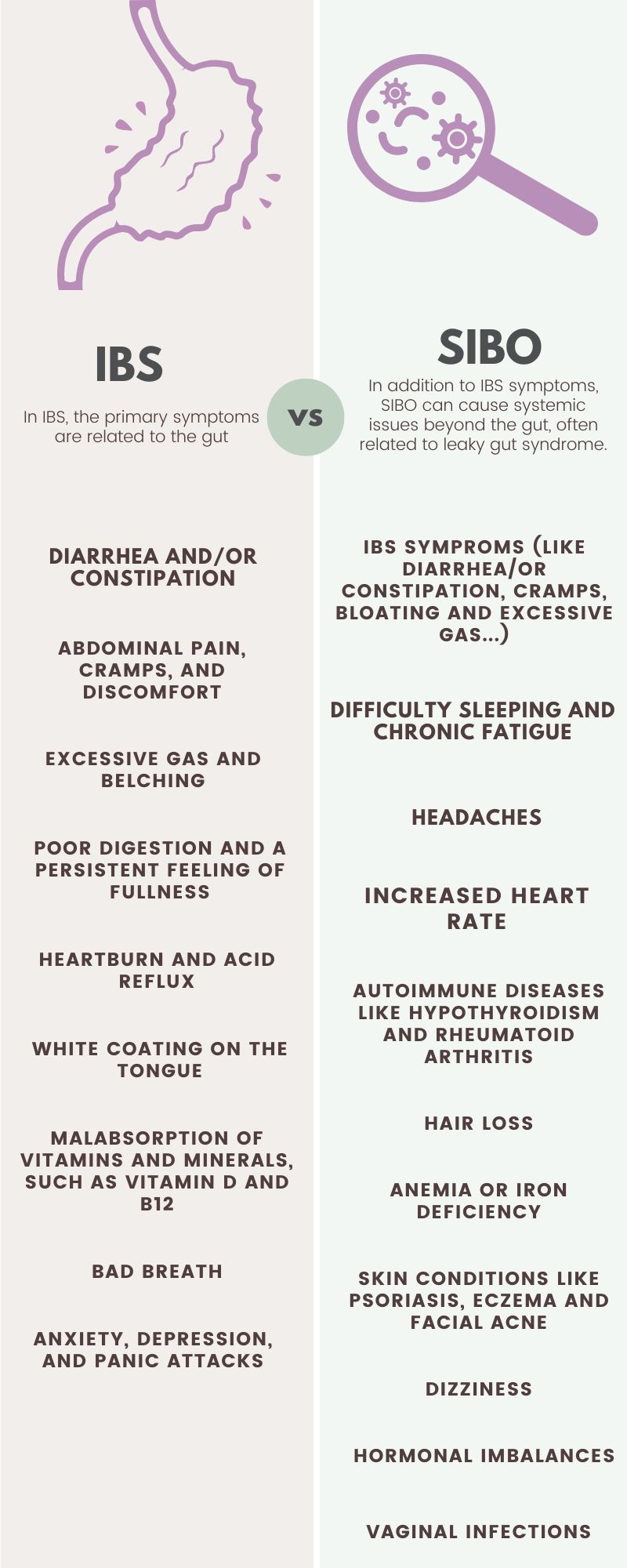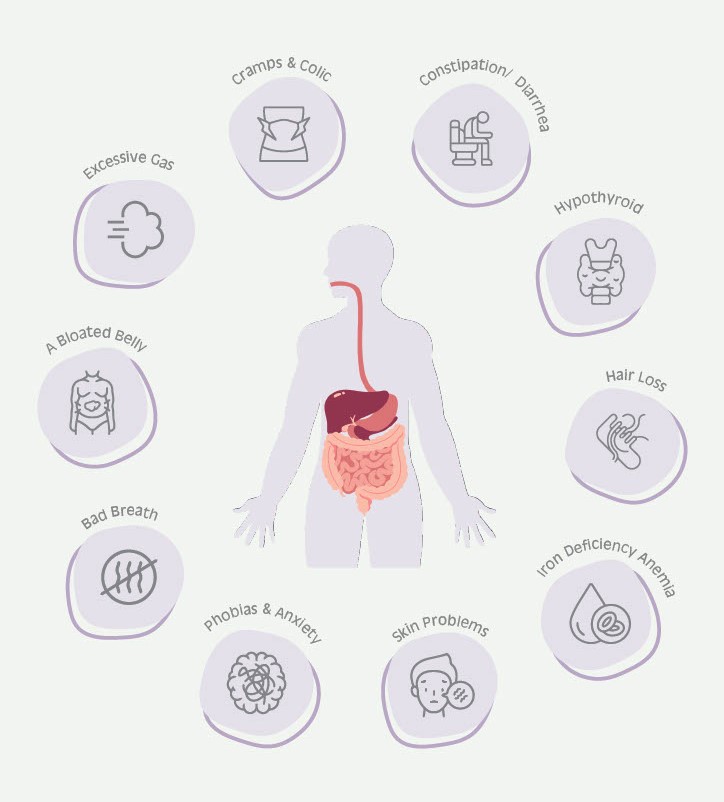Blog
SIBO vs IBS: what is the main key difference?
Prevalence of irritable bowel syndrome (IBS) and other digestive disorders continue to rise, with many doctors classifying these conditions as chronic diseases that require symptom management rather than a definitive solution. It’s a common misconception to rely solely on treating IBS symptoms like bloating, gas, constipation, and indigestion through medications like Librax or laxatives, without addressing the root causes of the issue. Following standard tests such as colonoscopies and stool analyses, many people receive a broad diagnosis of IBS. They are often advised to avoid gas-producing foods, manage stress, and take symptom-relieving medications rather than addressing what initially caused the condition.
While it’s normal to experience occasional digestive discomfort after large meals or during stressful times, it’s abnormal for these symptoms to become so severe that they disrupt daily life. Persistent issues like excessive gas, bloating, diarrhea, cramps, fatigue, and reduced quality of life may indicate a deeper problem.
One of the main underlying causes of IBS in up to 80% of patients is small intestinal bacterial overgrowth (SIBO), also IBS can be caused by several factors like food sensitivities (e.g., gluten and dairy), antibiotic overuse, long-term use of proton pump inhibitors (PPIs), and slowed intestinal motility, often seen in hypothyroid patients or those who have undergone bariatric surgery. While both IBS and SIBO affect the digestive system, their root causes differ. The key difference between SIBO and IBS is that SIBO is often the underlying cause of IBS, while IBS is a syndrome or collection of symptoms experienced by individuals with digestive issues, including SIBO. Therefore, treating SIBO can target the root cause, rather than just managing the symptoms associated with IBS. In this article, we’ll explore what SIBO is, how it differs from IBS, the necessary lab tests to differentiate between them, and natural healing steps.
Why Do IBS Patients Often Feel Lost and Trapped in a Dilemma?
IBS patients often feel lost and trapped in a dilemma because, despite experiencing debilitating symptoms like bloating, gas, and digestive discomfort, standard medical tests like endoscopies and blood work usually return normal results. This leads many doctors to dismiss their symptoms as psychological, causing patients to feel invalidated. The underlying issue for many IBS sufferers is often Small Intestinal Bacterial Overgrowth (SIBO), a microscopic condition that standard tests don’t detect. This gap in diagnosis leaves patients struggling without proper treatment, further contributing to their frustration and emotional distress.
What is SIBO vs IBS?
SIBO (Small Intestinal Bacterial Overgrowth) is a digestive disorder that occurs when bacteria from the large intestine migrate and overgrow in the small intestine, where they don’t normally belong. Once food reaches the small intestine, these bacteria ferment undigested food particles, leading to inflammation, ulcers, and waste buildup in the small intestine. This process triggers IBS-like symptoms such as cramping, diarrhea, constipation, severe bloating, and gas due to the excessive fermentation. It also hinders the absorption of essential nutrients, causing deficiencies and further digestive problems.
The primary distinction between SIBO and IBS is that SIBO is often the root cause of IBS, while IBS is a syndrome – a collection of symptoms that occur in individuals with digestive issues, including SIBO. Addressing SIBO, therefore, can help alleviate the underlying cause of IBS, rather than just managing the symptoms.
Causes of SIBO vs IBS:

In many cases SIBO and IBS are almost the same, SIBO is the main root cause while IBS is the collection of symptoms, and the root causes are almost the same between those two conditions. Several factors contribute to the development of Small Intestinal Bacterial Overgrowth (SIBO), including:
- Diet high in sugars and simple carbohydrates: Foods like pastries, sweets, and bread promote the growth of harmful bacteria in the small intestine.
- Food allergies: Whether they are genetic allergies and sensitivities such as gluten sensitivity in celiac disease patients, or dairy allergies when a person lacks the lactase enzyme responsible for digesting lactose, which is the sugar found in milk and dairy products, or acquired allergies such as gluten, dairy, corn, soy, and peanut allergies.
- Chronic antibiotic use: Prolonged use of antibiotics disrupts the balance of good and bad bacteria, leading to the overgrowth of harmful bacteria in the small intestine.
- Overuse of proton pump inhibitors (PPIs): Long-term use of acid-reducing medications lowers stomach acidity, which normally acts as a disinfectant to cleanse the digestive system of harmful germs like bacteria, fungi, and parasites. Reduced acidity allows harmful bacteria to thrive in the small intestine.
- Gastrointestinal surgeries: Procedures such as gastric sleeve surgeries can disrupt the bacterial balance, leading to dysbiosis—an imbalance between good and bad bacteria in the digestive system.
- Chronic stress: Ongoing physical and emotional stress raises cortisol levels, which can lead to bacterial overgrowth in the small intestine.
- Intestinal Hypomotility (Lazy Intestinal muscles) that happens in hypothyroidism, fibromyalgia and post sleeve surgery.
These factors create conditions that allow harmful bacteria to proliferate, affecting digestion, nutrient absorption and leading to irritable bowel syndrome.
Symptoms of SIBO vs IBS:

These symptoms can vary in severity but may significantly impact both physical and mental health, requiring proper diagnosis and treatment
Difference Between SIBO and IBS:

While Small Intestinal Bacterial Overgrowth (SIBO) and irritable bowel syndrome (IBS) share similar symptoms, their root causes are different. IBS is a functional digestive disorder, often associated with many conditions that predispose to IBS, whereas SIBO is caused by an overgrowth of harmful bacteria in the small intestine. These bacteria typically belong in the large intestine, but when they move to the small intestine, they can trigger digestive issues.
Research suggests that dysbiosis, including SIBO, can cause symptoms of IBS, though it is only one potential cause. This may explain why some people with IBS symptoms do not test positive for SIBO, for example, when their IBS is caused by weak stomach acids or lazy intestinal muscles or after gastric sleeve surgery. Studies have shown that SIBO is highly prevalent among individuals diagnosed with IBS, but not everyone with SIBO has noticeable symptoms.
Both conditions can interfere with digestive system function and cause similar issues like bloating, constipation, and diarrhea. However, while IBS is often defined by a collection of symptoms associated with many conditions that predispose to IBS, SIBO is specifically linked to bacterial overgrowth in the small intestine. In some cases, SIBO may be the underlying cause of IBS symptoms, but it’s possible to have SIBO without experiencing IBS symptoms.
Tests for Diagnosing SIBO and IBS:
Several tests can help diagnose Small Intestinal Bacterial Overgrowth (SIBO). However, if you consistently experience symptoms like bloating, gas, constipation, diarrhea, cramping, and indigestion, it’s highly likely that SIBO is the root cause of your IBS-like symptoms. Diagnosing SIBO is often challenging because it requires microscopic detection, and standard tests like endoscopies can produce false negatives. This can lead to further frustration for patients, as their symptoms may be dismissed, causing many IBS/SIBO sufferers to be inaccurately labeled as having psychological or mental health issues. Therefore, even if initial tests are inconclusive, the presence of these five key symptoms strongly suggests SIBO is at play:

Some of the important test to diagnose SIBO:
- Methane Hydrogen Breath Test: This common test measures hydrogen and methane levels in the breath after consuming a sugar solution (like lactulose or glucose). Elevated levels of these gasses indicate bacterial fermentation in the small intestine.
- Stool Test: Analyzing stool samples can reveal harmful bacteria or fungi, such as Candida or E. coli, which provides insights into gut health and potential infections. Furthermore stool calprotectin level could be high in patients with SIBO.
- White Blood Cell Count: Elevated levels of white blood cells may suggest bacterial overgrowth, indicating an immune response to infection.
- Antibody Testing for Fungi and Bacteria: This test checks for elevated levels of antibodies against bacteria or fungi, such as Candida, indicating an overgrowth of harmful organisms. Furthermore, thyroid autoantibodies can be high in people with SIBO and leaky gut.
For diagnosing irritable bowel syndrome (IBS), it mainly relies on a patient’s medical history, symptoms, and sometimes specific lab tests requested by Dr. Fajer Al Jumairi.
Natural Treatment for SIBO:
Healing from SIBO requires significant lifestyle and dietary changes. Remember, each person’s situation differs based on age, medical history, and the root cause of their digestive issues-whether it’s SIBO, low stomach acid, or sluggish bowel muscles. It is important to evaluate and diagnose each case individually, then apply personalized treatments and supplements as needed. Addressing the root cause offers long-term relief, while focusing only on symptoms may lead to persistent IBS and ongoing problems. By tackling the underlying issues, you can resolve SIBO and return to a normal diet, including gluten and dairy products.

Follow these five essential steps to address the SIBO and IBS:
- Elimination Phase: Remove foods that promote bacterial overgrowth, such as sugars, gluten, and dairy products. Additionally, eliminate foods that trigger intolerances or allergies, and avoid processed inflammatory foods. The SIBO and IBS-friendly diet often includes a low FODMAP diet or elimination diet.
For a detailed, personalized meal plan to address SIBO and IBS, click the link below to join our program for comprehensive guidance and a complete list of restricted and permitted foods:
- Enhancing Digestion: Support digestion by supporting a strong stomach acid, digestive enzymes and improve nutrient absorption by using digestive enzymes pills or apple cider vinegar.
- Killing Harmful Bacteria: Eliminate harmful bacteria by incorporating natural antibacterial foods and supplements, such as coconut oil and garlic.
- Gut Repair: Consume foods that promote healing of the gut lining, like bone broth and omega-3-rich foods.
- Reintroducing Good Bacteria: After eliminating harmful bacteria, restore gut balance by taking probiotics to repopulate beneficial bacteria.
Important Note: If you are suffering from SIBO, avoid consuming fermented foods and probiotic supplements at the start of your treatment. Wait until after the fourth week to begin incorporating them into your regimen.
Conclusion:
SIBO is a challenging digestive condition that requires a holistic approach, focusing on lifestyle changes and a healthy diet. Addressing the root causes through proper diagnosis and natural treatments can lead to effective healing. Avoiding harmful and inflammatory foods and using natural supplements can significantly support the recovery process, helping to improve digestive health and overall well-being.
To learn more about the difference between IBS and SIBO, please refer to Dr. Fajer Al Jumairi YouTube channel and watch this episode:

